|
90 (48) Frindsbury Road
Frindsbury
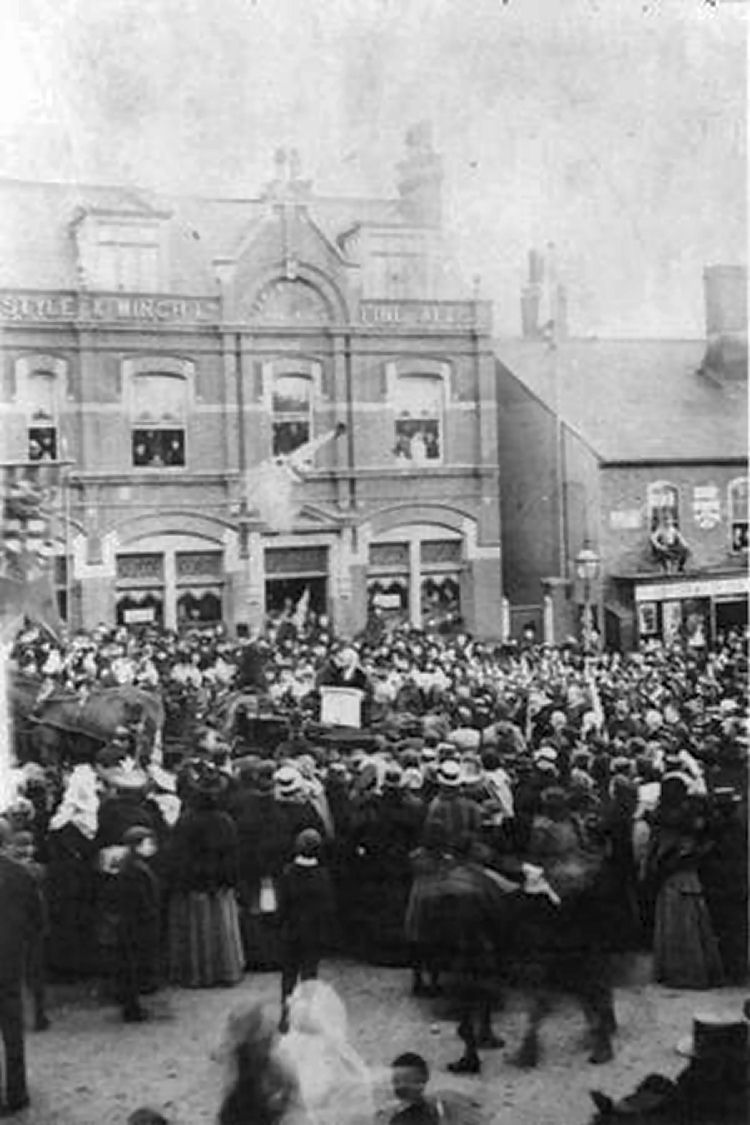
Crowds look on as dignitaries make an announcement or proclamation
outside the Marlborough Head in 1900. |
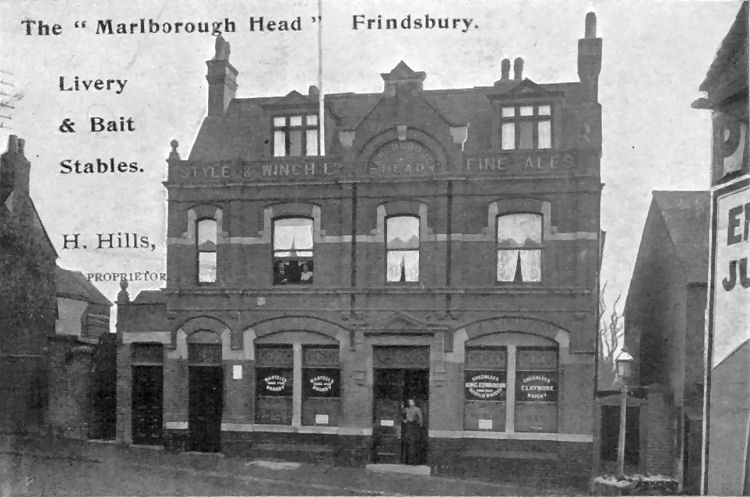
Above postcard, 1907. |
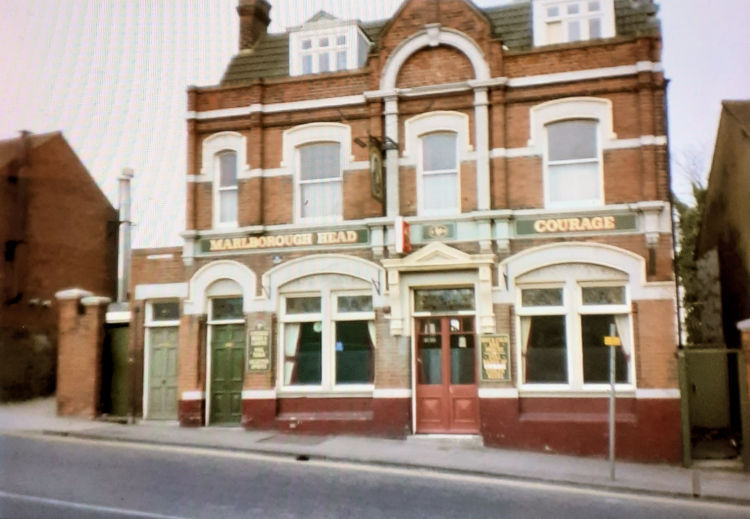
Above photo, 1990s. |
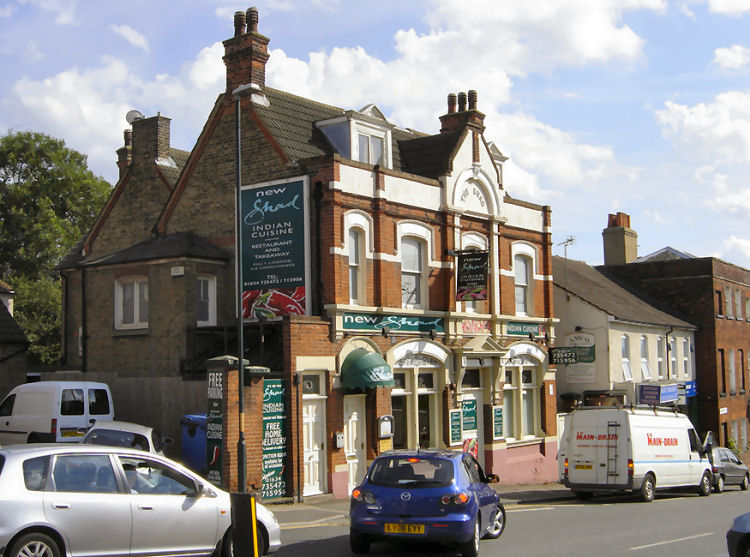
Above photo 29 June 2010, from www.Flickr.com
by Ben Levick. |
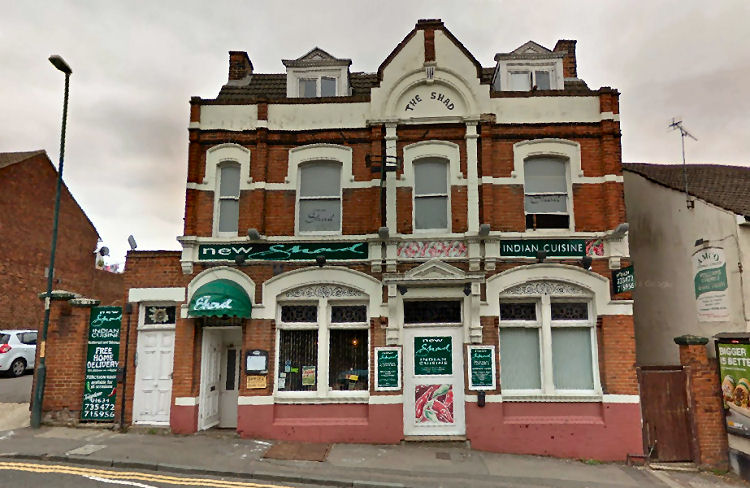
Above Google image, August 2018. |
I have also seen this addressed as in Strood.
The original building was destroyed in a fire which killed the landlords
wife in 1899, and the building we see today was built in 1900.
|
Kentish Gazette, 9 May 1820.
Kentish Weekly Post or Canterbury Journal 9 May 1820.
On Tuesday morning about half-past two a fire broke out at the
"Marlborough Arms" public-house, in Frindsbury.
It was first discovered by the constable of the night, who gave the
alarm, and burst in some of the windows of the first floor, just in time
to enable the family to escape. Mr. Elliott, the landlord, being able
only to secure and take with him a small box, containing some property.
From want of water for some time, the fire raged with great fury, and
soon burnt down three houses, with great part of the furniture: and
three other houses were pulled down to prevent further communication -
every possible exertion was made to arrest the progress of the terrible
conflagration.
It is not correctly ascertained how the fire originated,
but report states it to have been occasioned by the ashes from some
tobacco-pipes having been emptied into spittoons.
The residence of the
Rev. Mr. Joynes was close to the place, and the family were exceedingly
alarmed, but the premises escaped injury. A very small part of the
property excepting that of Mr. Elliott was insured.
|
|
West Kent Guardian, Saturday 4 January 1840.
Rochester and Chatham. Distressing Inquisition.
On Monday last a coroner's inquest was held at Mr. White's, "Marlborough
Head," Frindsbury, touching the death of a little girl, named Hannah
Lows, and aged 4 years. After the coroner had sworn the jury, they would
repaired to the dwelling, which was close by, to take a view of the
body, when, to the horror of everyone, they beheld the infant corpse
lying on a couple of chairs without any covering. It's legs were tied
together with a piece of rope, and several severe burns were about the
body. It's mother was found huddled up in one corner of the room with
scarcely any covering, and disgustingly filthy, and appeared to be
labouring under severe illness.
The first witness, Mrs. Wynn, sworn:- I reside next door to Mrs. Lows;
on Tuesday afternoon, 24th December, between 3 and 4 o'clock, I heard
some screams proceed from Mrs. Lows room; I went in, and found the child
running from the fireplace in flames; I extinguish them as soon as
possible, and a neighbour, Mrs. Higgins, procured sun flour, which was
we put to the burnt parts. The mother all the while was lying on the
floor before the fire-place in a state of stupefaction, owing to her
having taking opium and decoction of poppy heads. In the evening I had
occasion to go to Mr. Seaton's, the surgeon, and I then acquainted him
with the accident. The doctor said he must have an order from the
relieving officer before he could attend; the doctor did not attend the
child until next day. About 8 o'clock on Wednesday evening, I heard the
child fall from the chairs where it was lying, onto the ground, and
again about 9 o'clock. Both times I laid it up again. I found the child
very uneasy and dirty; it was lying on a blanket, and seem to want
nourishment. The mother all this time remained lying on the floor
stupefied, and unconscious of what had happened. She is supported by the
parish. I gave the deceased a little water and some food. About a
quarter to 10 o'clock I heard the Child fall again; I went in and placed
it on its bed; it appeared very bad, and I remained with it until it
died, which was at half past 10 o'clock on Wednesday night.
To a question put by the jury:- I went to the surgeon about 6 o'clock on
Tuesday evening, when he said he could not attend without an order. I
went to the relieving officer and procured and order. I did not take it
to him myself, but sent a boy, named Higgins, with its. It was then
about 11 o'clock.
To further questions she said, I told the doctor the nature of the
burns; he said they were fatal.
Mr. Seaton, the surgeon, stated, that he resided at Rochester, and was
the medical officer for the Strood district of the North Aylesford
Union. It was on Tuesday evening, 24th of December, that he first heard
of the accident. His informant was Mrs. Wynn; she came to his house for
some medicine for her son; and it was then she told him, but shortly
after he had left Mrs. Lows', where he had been professionally attending
the child's mother, the accident occurred. He question Mrs. Wynn as to
the extent of the burns, and, from her description, he felt certain they
were necessarily fatal; he asked her what remedies she had applied, and
she said some flour, which he thought very proper; he was engaged out
that evening, and did not arrived home until 1 o'clock in the morning,
when he found an order from Mrs. Sedgwick, the relieving officer, to
attend the deceased. He attended accordingly, next morning about 11
o'clock, when, what he ahd stated the previous evening, he was able to
confirm, as to the nature of the injuries. Examining the wounds, he
found the burns were very extensive over the left side of the belly,
chest, and face, and down the right arm. He applied a lotion, and, when
he called again on Tuesday, he found the child died the night before.
The death of rose from the burns.
To a question from the jury:- I was professionally engaged on Tuesday
evening. I only went to visit a friend who had come distance. Upon cases
of emergency I attend without an order from a relieving officer. If I
had attended I could not have saved the child.
The Jury expressed an opinion that this case appears to have been one of
emergency, and that the surgeon should have attended.
The Coroner said, that, "in this case, the state had not lost anything."
After some strong expressions from the jury as to the neglect, &c., the
mother of the child was brought by the officer, Mr. Tuff, and placed
before the coroner; nothing, however, could be elicited from her how the
accident occurred. The jury returned a verdict:- "Died from injuries
received from the clothes accidentally catching fire, and the jury are
of opinion that there has been great neglect on the part of the mother.
|
|
Kentish Gazette, 22 October 1850.
Inquest.
On Saturday week and inquest was held at the "Marlboro' Head,"
Frindsbury, before J. Lewis Esq., coroner, on the body of an infant
child name William James Watkins, who was accidentally burnt to death on
Thursday, from his clothes catching fire, in the absence of his parents.
Verdict, "Accidental death."
|
|
Southeastern Gazette, 4 January 1853.
CITY PETTY SESSIONS.
Wednesday. (Before the Mayor, Capt. Burton, Dr. Drawbridge, E. R.
Coles, Wm, Manclark, and J. L. Levy, Esqrs.)
James Collins was charged with having wilfully and maliciously
damaged a gas-burner at the "Marlborough Head," Frinsbury. As it
appeared to have been broken by accident, the case was dismissed,
and the defendant immediately paid the complainant 3s., the amount
of damage.
|
|
From the Maidstone Telegraph, Rochester and Chatham Gazette, 19 October 1861.
Maidstone Insolvent Court.
George Frederick Truman, of the "Marlborough Head Inn," Frindsbury,
Rochester, Kent, licensed victualler.
Supported by Mr. Morgan and opposed by Mr. Goodwin.
Adjourned till 20th November.
|
|
From the Maidstone Telegraph, Rochester and Chatham Gazette, 21 December 1861.
Insolvent and Bankruptcy Court. Insolvents.
George Frederick Trueman, of Frindsbury, licensed victualler.
Supported by Mr. Morgan. Opposition being withdrawn he was discharged
forthwith.
|
|
From a local paper, March 1899.
A fatal fire occurred yesterday morning at Frindsbury, near Rochester,
when the "Marlborough Head" public-house was totally destroyed. The
landlord, Alfred Norman, retired to rest before 11 o'clock on Saturday
night, leaving his wife to follow. He awoke to find the house a mass of
flames, and only succeeded in making his escape by jumping from a
window. The charred remains of Mrs. Norman was subsequently found. In
attempting to subdue the fire, which is believed to have been caused by
a lamp exploding, Captain C. D. Levy, of the local fire brigade,
sustained some injuries.
|
|
Maidstone Journal, 30th March 1899.
Fatal fire at Frindsbury.
A disastrous fire occurred at Frindsbury during the early hours of
Sunday morning, and resulted in the complete destruction of the
"Marlborough Head Inn" and a death of the landlady, whose body was
almost entirely consumed.
The house, which belongs to Messrs. Style and Winch, Ltd, the well-known
brewers, was kept by Mr. Alfred Norman, who had formerly served in the
Royal Engineers.
Mr. Norman who was recovering from an attack of influenza, retired to
rest at half past 10 o'clock on Saturday night, leaving the bar in
charge of his wife. Mrs. Norman let her assistants out at 12 o'clock,
and, it was thought, was then herself about to retire for the night. A
few minutes after 1 o'clock, however, the house was discovered to be in
flames.
The landlord, who was sleeping in a bedroom at the front, was aroused by
the crackling of the fire and the smashing of glass. The lower part of
the house was then already well alight. Norman vainly endeavoured to find
his wife. The poor woman was apparently then already overcome by the
fire and smoke, as he neither saw or heard anything of her. Norman next
sought to escape from the burning building. He first attempted to
descend the stairs, but finding all means of exit in that direction cut
off, he rushed to the back of the house, sprang through a window, and
escaped into the yard below. The unfortunate man was then clad only in
his night attire. A ladder was quickly secured, and gallant attempts at
rescue were made by Mr. F. Skilton, a man named Smith, and others; but
so furiously did the fire burn within that all hopes of recovering the
unhappy woman had to be abandoned.
Owing to the inflammable nature of the internal arrangements, the flames
spread with astonishing rapidity. The house was old, and was most
peculiarly constructed. The whole of the partitions were either composed
of lath and plaster or match boarding, and these literally added fuel to
the fire.
Within a quarter of an hour of the discovery of the outbreak every room
had become involved, and the house inside was one seething mass of fire.
A high wind prevailed at the time and rain in torrents, rendering the
task of the fireman in battling with the fire disagreeable as well as
difficult. The flames for sometime shows no sign of abatement, and,
leaping high into the air, lit up the sky from miles around.
Eventually the fire was subdued, and by 7 o'clock it was practically at
an end. Only the four blackened and battered walls was left standing. It
was not until early 9 o'clock that the place had been sufficiently
cooled down to allow of anyone entering to search for the remains of the
unfortunate woman, who was known to have perished in the flames.
The fireman, and a body of Corporation workmen dug for upwards of an
hour and ultimately discovered - beneath about six feet of debris in the
basement - a few charred bones, including part of the skull, a shoulder
bone, and a hip bone. The rest of the body had apparently been entirely
consumed.
No cause can be assigned for the fire. It is thought by many that Mrs.
Norman fell with a lamp on the stairs, but this is a mere conjecture.
Much sympathy is expressed for Mr. Norman.
The house was insured in the Kent office.
|
|
The Stage, Thursday 11 November 1976.
Kentish is where the hops really come from. That fact alone makes the
County pubs Country! And pubs are big business on the showbiz front
today. You can forget the idea that down here that all the pubs are
oak-beamed and full of yokels moving at a snail's pace.
Entertainment is IN at the INNS take my word. No, don't take my word
just listen to the people I've been talking to in an in-depth round up.
....
Roger Dunne recently took over the "Marlborough" on the Strood outskirts
and the first thing he decided to install were entertainers.
He said:- "At the moment my licence only covers a maximum of two
performers which restricts me to basics like a pianist and drummer, or
organist and singer. For the moment it is sufficient to attract. You
have to remember, too, that most pubs in Kent were never constructed or
designed for entertainment on a big scale. It would be silly to try and
cram in big outfits, if props and band gear left no room for customers!
The move back into pubs, however, is growing and fast.
Guitarist singer Ted Connolly was struggling for spots in club cabaret
nights a couple of years back.
Now listen to him. "I'm constantly turning down work; there isn't a day
passes when at least two licensees ring me. At the present rate I could
work pubs for the next three years."
Ted's attraction to a licensee is that he is truly portable and takes so
little room in the bar - and has a big repertoire of songs that go
across the board. He is also an excellent guitarists.
....
I think I will - and pop out for a ginger ale.
Jimmy Hodge Jnr.
|
The pub closed in the early 2000s and by 2008 the building had been taken over by an Indian restaurant called
the "Shad."
LICENSEE LIST
ELLIOTT George 1820-32+
 
MANTLE William 1841+ (age 50 in 1841 ) )
KNOWLES Thomas 1847+
WISSENDEN Sarah Ann 1851+ (widow age 27 in 1851 ) )
SUTTON Thomas 1858+
TRUMAN George Nov/1861+ (age 52 in 1861 ) )
DEAN Mr 1863+
STANDING William 1871+ (age 57 in 1871 ) )
WILKINS William James 1874+
MILLS James 1881+ (age 59 in 1881 ) )
JUDGES George 1881+
FOSTER John C 1891+ (age 47 in 1891 ) )
WILLIAMS Arthur Ernest 1901-03+ (age 44 in 1901 ) )

NORMAN Alfred 1899+
HILLS H 1907-08+
EVANS William Charles 1913+
MAPLESDEN Albert Edward 1918-22+
HOAD Alexander T 1930+ (not Hodd ) )
JARRETT Arthur 1938+
MOORE A W 1955+
DUNNE Roger 1976+
https://pubwiki.co.uk/MarlboroughHead.shtml
http://www.closedpubs.co.uk/marlboroughhead.html
 From the Pigot's Directory 1828-29 From the Pigot's Directory 1828-29
 From the Pigot's Directory 1832-33-34 From the Pigot's Directory 1832-33-34
 Census Census
 From the Post Office Directory 1930 From the Post Office Directory 1930
|




